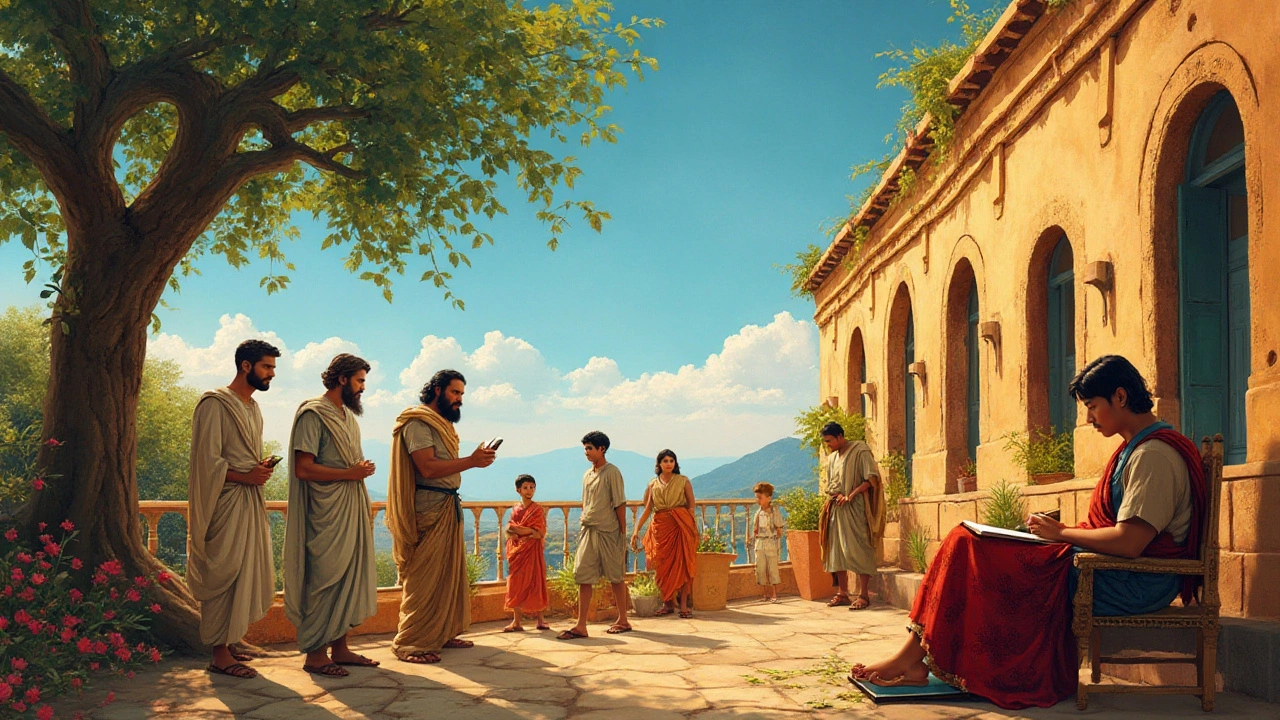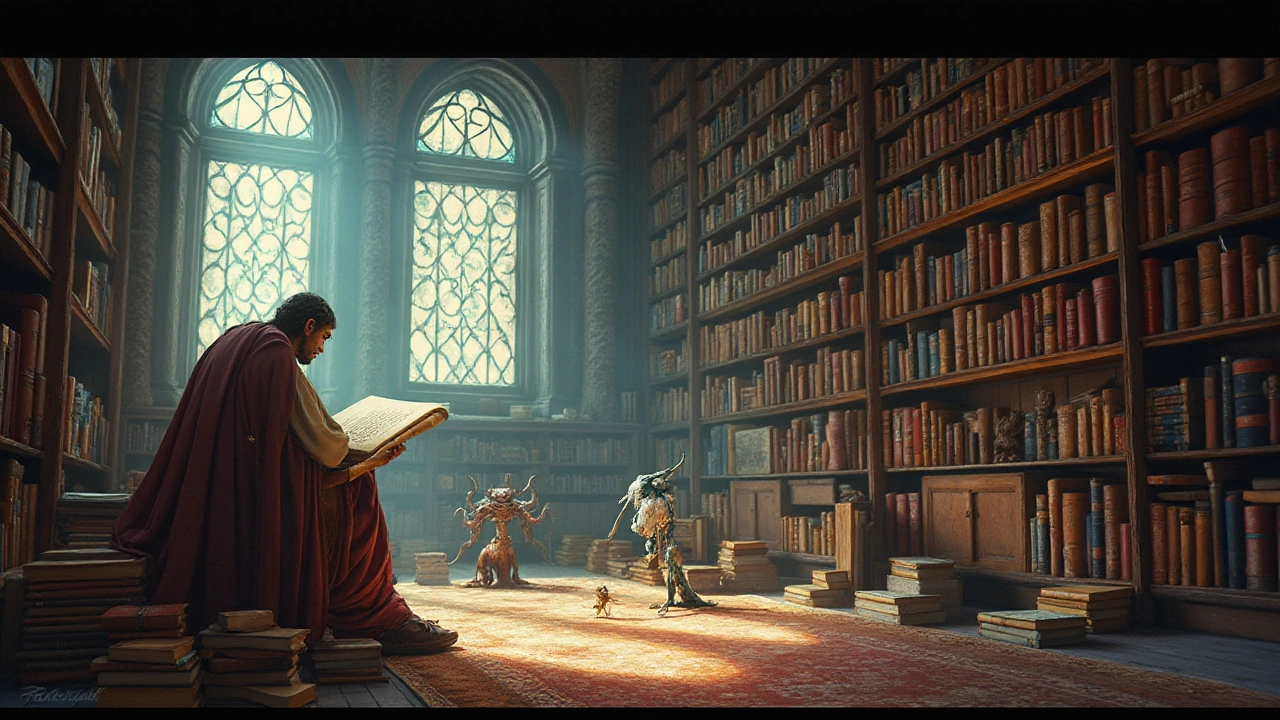Exploring Muthos: The Heart of Mythological Fiction
 Jan, 13 2025
Jan, 13 2025
Muthos, a word often whispered through the annals of literary history, weaves the very threads of myth and legend. In the world of mythological fiction, it stands as more than just a tale; it is a journey into the heart of human storytelling.
Emerging from the depths of ancient Greek literature, muthos originally denoted speech or word but eventually grew to signify the tales that encapsulate the culture and values of civilizations. As we explore this fascinating concept, we uncover its role in shaping narratives past and present, offering a rich tapestry of legends that continue to captivate our imagination.
Join us as we delve into the core of muthos, discovering how it has influenced cultures, steering the helm of storytelling from ancient Greece right through to the narratives that fill our bookshelves today.
Defining Muthos
At the very heart of mythological storytelling lies muthos, a term steeped in history and rich with significance. Derived from the ancient Greek language, muthos initially represented mere utterance or speech. However, as words often do, it transcended its literal origins to become a key element of storytelling, especially in the context of myths and legends. A muthos is more than just a story; it is a narrative framework that guides the development of a society's values and beliefs. The ancient Greek texts, rich repositories of cultural tales, utilized muthos to convey messages of morality, heroism, and the divine interplay between gods and humans.
Understanding muthos requires us to delve deeper into the Greek psyche, where these narratives served as a medium for exploring human nature and the divine. Unlike the modern-day fiction, where emphasis often lies on individual creativity, muthos in ancient times was rooted in shared stories, widely embraced by the community and repeated across generations. Each retelling carried variations reflective of time and prevailing thoughts, yet the core essence remained unchanged— a testament to its power and endurance. It's fascinating how each culture molds its own version of muthos, yet fundamental themes, like heroism and morality, resonate universally across different societies. By examining these ancient narratives, we begin to see a pattern emerge, one that reveals much about the collective human experience and how stories have always served as a mirror to societal norms.
The evolution of the concept of muthos can also be traced through its comparison with its counterpart, logos, which denotes logical reasoning or structured discourse in Greek philosophy. This duality highlights the persistent tension and balance between traditional storytelling and rational thought. While logos appeals to intellect and order, muthos stirs the emotions, offering a more mystical and intuitive understanding of the universe. In storytelling, this dynamic interplay creates depth and complexity, inviting audiences to engage both emotionally and intellectually. This is particularly evident in the works of classical writers like Homer and Hesiod, who masterfully weave logical structure with imaginative narratives, crafting timeless tales that continue to inspire and provoke thought in today's readers.
Exploring muthos gives us insight into the human condition, reflecting timeless themes that persist regardless of era or culture. Remarkably, as these stories migrate across borders, they metamorphose, absorbing bits and pieces from each new setting, yet retaining their fundamental cores. This adaptability not only ensures their survival through millennia but also amplifies their significance, proving that, at their heart, these tales connect us to something deeply universal and fundamentally human. They serve as windows through which we can glimpse our history and understand how we've been shaped by our ancestors' experiences and values.

Historical Origins
The term muthos finds its roots in ancient Greece, where it originally referred to speech, story, or narrative. It was a time when oral tradition was the cornerstone of cultural transmission, and the spoken word held profound power. The Greeks used muthos to convey not only tales of gods and heroes but also to impart lessons and moral values. This storytelling tradition laid the groundwork for Western narrative structures. The works of Homer, such as the "Iliad" and the "Odyssey," are prime examples of early muthos. These epic tales weren't just entertainment; they were educational, teaching audiences about the ideals of heroism, honor, and the divine.
In understanding the transformation of muthos, one must explore its place in Greek literature and theater. Mythology intertwined with historical events drew audiences into complex moral questions and societal dilemmas. Sophocles and Aeschylus, celebrated playwrights, used muthos to explore themes of fate, justice, and the human condition. Their works often blurred the lines between reality and myth, reflecting the worldview of their time. Aristotle, a towering figure in philosophy, recognized the power of muthos in his seminal work, "Poetics." He noted that while history tells what happened, muthos envisions what could or should happen. According to him, "tragedy is an imitation of an action that is serious, complete, and of a certain magnitude."
This deep-seated tradition of narrative was essential for cultural cohesion among ancient Greeks. It created a shared repertoire of stories that reinforced community values. While myths may appear as flights of fancy, they comprised the very foundation of Greek identity. The lineage of gods, heroes, and the moral codes encapsulated in muthos can be traced to other cultural tales, showing similar storytelling elements across ancient civilizations. This highlights the universal nature of myth-making, cementing muthos as a global narrative archetype.
Delving into the historical tapestry evidences the enduring nature of these stories. Even as ancient Greece laid the theoretical groundwork, muthos echoes through time, influencing later cultures and literary traditions. From the Roman adaptations of Greek stories to the medieval reinterpretations of classical myths, the essence of storytelling through muthos transcends time and space. It remains a testament to humanity's innate desire to understand our world and convey knowledge through the art of narrative.

Muthos in Modern Fiction
As we traverse the pages of contemporary literature, the influence of Muthos becomes unmistakably vibrant. Today's writers often root their narratives in the rich soil of mythological tradition, crafting stories that echo the timeless truths these ancient tales convey. Modern fiction borrows liberally from myth, often reimagining and reshaping traditional narratives, making them relevant to today's society. The allure of mythology lies in its universality; it provides a foundation for stories that resonate across cultures and generations.
One cannot discuss modern mythological fiction without mentioning novels like "American Gods" by Neil Gaiman. Here, Gaiman deftly interweaves ancient mythos with contemporary reality, exploring the dynamic interaction between old-world gods and new-world beliefs. This novel, along with others in its genre, reflects a growing appetite for stories that straddle the line between the mystical and the mundane. Such works do not merely retell ancient stories but actively engage with them, posing fresh questions and perspectives that allow readers to reconsider the elements of myth in light of modern experiences.
Another notable example is Madeline Miller's "Circe," which is grounded in Greek mythology. Miller breathes new life into the classic tale by shifting the narrative focus to a traditionally marginalized character. In doing so, mythos serves as a vehicle for exploring themes of agency, transformation, and identity. The novel demonstrates the fluidity of myth, showing its capacity to adapt and thrive in the hands of a skilled storyteller. Readers are invited to perceive ancient stories through a new lens, appreciating the depth and complexity these myths can offer in reimagined formats.
Flourishing within the broader genre of fantasy, mythological fiction often employs mythos as a universal thread connecting disparate elements within a single narrative tapestry. This genre bears witness to the enduring human quest for meaning, evident in J.K. Rowling's "Harry Potter" series, where magical creatures and legendary relics draw heavily from historic myths and folklore. Such stories resonate as they traverse the divide between reality and imagination, inviting readers to step into worlds vast with possibilities. They underscore the power of myth to both challenge and comfort, offering a means of escape while subtly revealing truths about our own existence.
The use of mythological themes and plot devices is also evident in the growing popularity of films and television shows inspired by modern mythos. Productions such as "The Witcher" and "Percy Jackson" bring to life the fantastical elements of classic myths for new audiences, keeping them relevant and exciting. This vigor within visual media showcases the seamless transition of myth from oral tradition to digital storytelling, engaging viewers in narratives that are as old as time yet as fresh as today. It's clear that these tales, with their roots in the past, hold a unique power to engage our imaginations in the present.
Moreover, the adaptability of mythos ensures its continued presence in the evolving landscape of fiction. It allows for the exploration of diverse cultural narratives, bridging geographical and generational gaps. As modern authors experiment with genre and form, mythological themes offer a timeless foundation upon which to innovate. They invite introspection about humanity's shared stories and values, reinforcing the essential truths they contain. With its deep, ancient roots and branches stretching into every corner of modern storytelling, muthos remains a beacon for those navigating the ever-developing avenues of contemporary fiction.

Cultural Impact
The concept of muthos transcends time and borders, becoming a fundamental element of cultural storytelling. As societies across the globe developed their own folktales, legends, and myths, muthos manifested in diverse ways, embedded within the core of each culture's identity. These tales were not just stories for entertainment; they were the vessels through which morals, values, and historical accounts were passed down through generations. In cultures where written language was yet to evolve, muthos served as the primary vehicle for documenting traditions and beliefs, offering an oral history that shaped social norms and ethics.
The ancient Greeks, for instance, utilized muthos to explain natural phenomena and human behaviors. From the wrath of Zeus manifesting in thunderstorms to the changing of seasons explained through the tale of Persephone, these stories provided a framework that made sense of the universe's complexities. Elsewhere, in Aboriginal Australian cultures, the Dreamtime stories constitute their muthos, offering explanations of the land's origin and the sacred laws governing humanity's relationship with nature. These stories were integral in forming bonds within communities, uniting them under a shared understanding and respect for their environment.
"Through the preservation of stories, cultures maintain continuity and connection to ancestry." — Joseph Campbell, The Power of Myth
In modern society, the influence of muthos persists, not only in literature but in films, television, and other forms of media that constantly recreate and reinterpret these ancient tales. The surge in popularity of myth-based series and movies underscores the enduring appeal of these timeless narratives. Consider the resurgence of Norse myths in popular shows like "Vikings" or the retellings of Greek myths in novels such as Madeline Miller's "Circe". Each adaptation breathes new life into old stories, adapting them for contemporary audiences while retaining their core essence.
Moreover, in today's interconnected world, the impact of muthos is not limited by geography or language, allowing individuals from disparate regions to find common ground in shared stories. Digital platforms have enabled a renaissance of sorts, where myths from various cultures can be discovered, appreciated, and fused into something new. This is evident in the popularity of global mythological forums and collaborative storytelling projects that draw inspiration from multiple traditions. By merging elements of different muthos, we not only expand our imaginations but also foster a greater appreciation and understanding of cultures beyond our own.
A deeper look into the specific cultural influences of muthos reveals that these narratives play a vital role in shaping our collective consciousness. As we continue to embrace and reinterpret these legends, muthos remains a powerful tool for both cultural preservation and innovation, bridging gaps between past and present and offering a shared ground upon which new stories may be built.